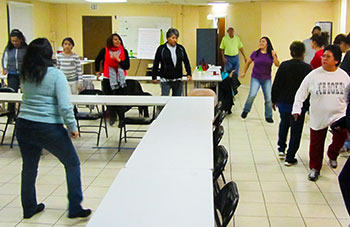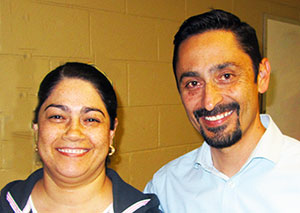CHARLAR Pushes Healther Habits
Serving Latinos at Risk
By Mark Couch
 CHARLAR classes include exercises that can be done at home.
CHARLAR classes include exercises that can be done at home.
(November, 2014) Laura Cortez has banished soda from her house. Potato chips, too. And she told her husband to quit buying all those packages of cookies. She worries that their youngest son will develop diabetes, a disease her husband has already.
She says she noticed that she was getting winded after walking up a flight of stairs, so she’s also made a commitment to exercise a half-hour every day.
Cortez is forming these healthier habits thanks to a program called Community Heart Health Actions for Latinos at Risk (CHARLAR), a 12-week education course encourages better eating and exercise routines for older adult Latinos and their families who live in northwest Denver. The course is taught by a team of promotores de salud who delivers several classes throughout the week.
On a Wednesday evening in late February, Cortez and 15 other people gather in a meeting room at Our Lady of Guadalupe Church for the “Controlling High Blood Pressure” class taught by Fernando Pineda-Reyes, promotor de salud and founder of CREA Results, a community-based organization that partners with the Colorado Prevention Center.
Participants grab disposable cardboard bowls of pozole de pollo—a soup with lettuce, hominy, chicken and radishes—and settle into their seats as Pineda-Reyes begins to speak to them in Spanish.
He starts with a review of the previous week’s class and a discussion about changing children’s eating habits. One woman talks about how she sneaked vegetables into a favorite dish and her children liked the meal better than usual.
Then, Pineda-Reyes begins talking about the refillable water bottles that each participant received in class. He recommends they drink more water throughout the day. When one man says drinking more water every day means going to the bathroom more often, Pineda-Reyes tells him that’s OK because he’ll be getting more exercise with those extra steps.
The class takes a break to do some light physical exercise and then the conversation continues with a discussion on blood pressure. Pineda-Reyes encourages participants to read food labels, control salt intake, adhere to medication and manage stress.
CHARLAR offers practical advice that participants can work into their everyday lives. Pineda-Reyes, who cofounded CREA Results with his sister, gives each session a dose of good humor, a dash of common sense and a heap of caring.
“I don’t call this a class,” he says. “It’s a conversation.”
CHARLAR was developed by the Colorado Prevention Center (CPC), a nonprofit community health and clinical research organization affiliated with the University of Colorado School of Medicine. The CPC Community Health division provides evidence-based programs to fight cardiovascular disease in underserved populations. The CHARLAR program is primarily funded by The Colorado Health Foundation, the state Office of Health Equity and the Anschutz Foundation.
 CHARLAR takes the message out of hospitals and doctors’ offices and into places closer to people’s hearts: their homes, churches and neighborhoods. Cortez says her church, St. Cajetan, had an event where she was signing up for a mammogram, and that’s when she saw the schedule for the CHARLAR program.
CHARLAR takes the message out of hospitals and doctors’ offices and into places closer to people’s hearts: their homes, churches and neighborhoods. Cortez says her church, St. Cajetan, had an event where she was signing up for a mammogram, and that’s when she saw the schedule for the CHARLAR program.
The course was available at no charge to the participants; it required only a commitment of time, so Cortez signed up. She is part of the group scheduled to graduate in spring 2014. Since CHARLAR started in 2008, more than 1,300 people have participated in the program.
Students at the School of Medicine have supported the program by assisting cardiovascular disease and diabetes screening events that occur before and after the 12-week education series.
When he helped with a screening day after the fall 2013 CHARLAR course, Igor Shumskiy, who graduated in May 2014, says he found that participants lowered cholesterol, decreased blood pressure and lost weight.
“It was really impressive,” Shumskiy says. “They were very energized and motivated, and that’s what you need if you want to make a change.”
While CHARLAR’s classrooms might be humble spaces, the results of the program are profound and life changing.
“We know we’re not just touching people, we are transforming the way a community goes about health,” Pineda-Reyes says. “We don’t do magic. We do what’s tangible.”
 CHARLAR classes include exercises that can be done at home.
CHARLAR classes include exercises that can be done at home. CHARLAR takes the message out of hospitals and doctors’ offices and into places
CHARLAR takes the message out of hospitals and doctors’ offices and into places